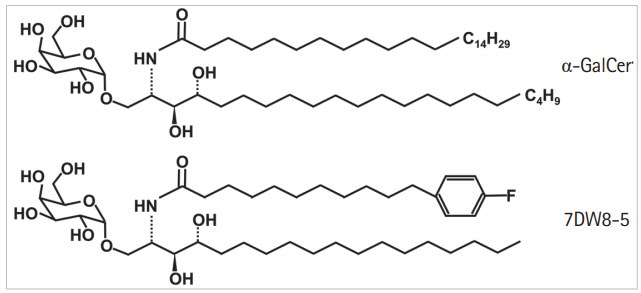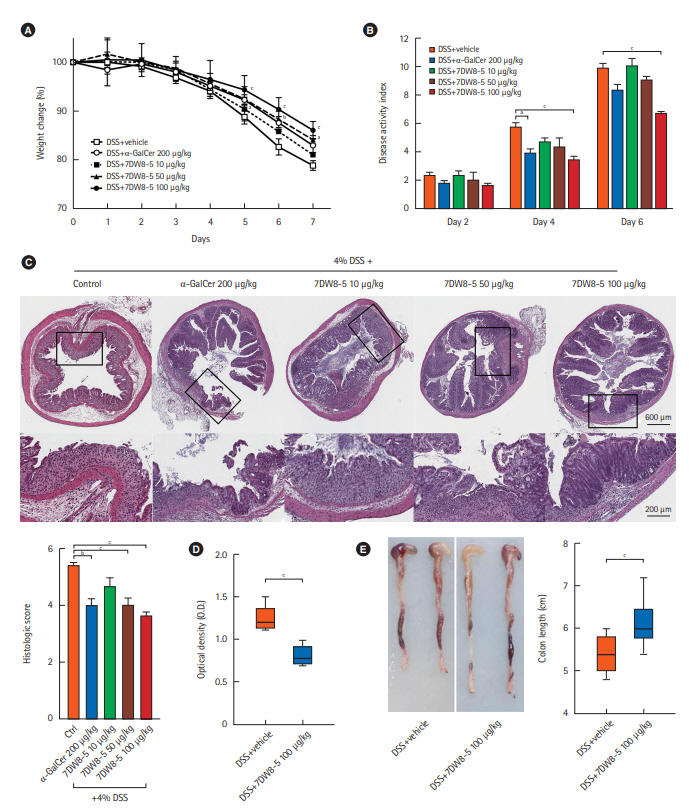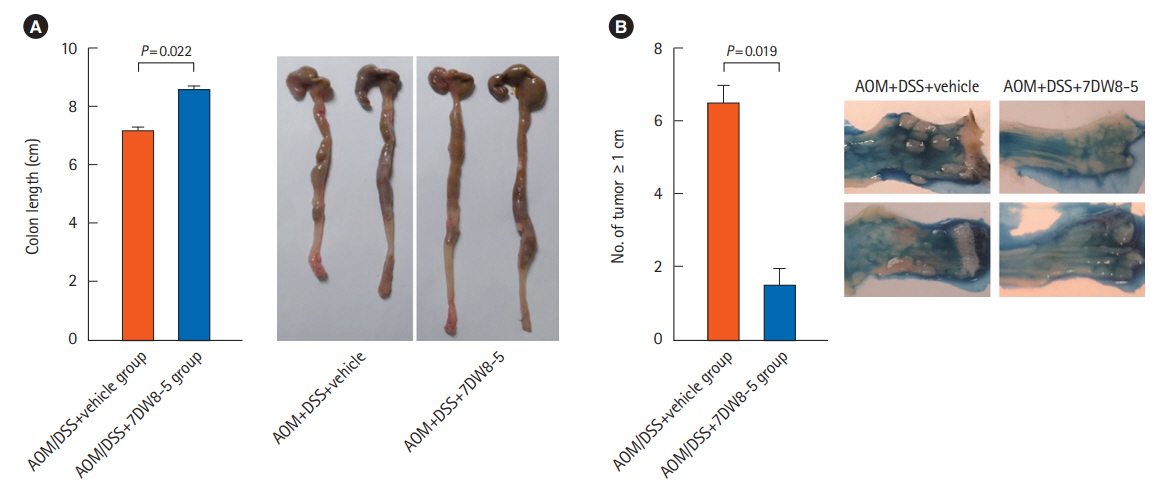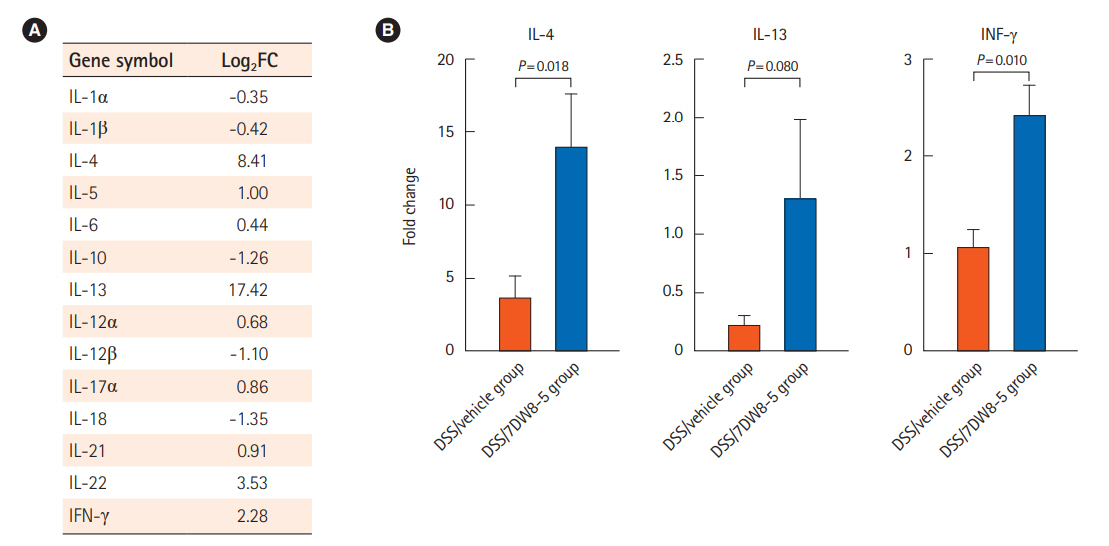Intest Res.
2020 Oct;18(4):402-411. 10.5217/ir.2019.00132.
A glycolipid adjuvant, 7DW8-5, provides a protective effect against colonic inflammation in mice by the recruitment of CD1d-restricted natural killer T cells
- Affiliations
-
- 1Samsung Biomedical Research Institute, Samsung Medical Center, Seoul, Korea
- 2Department of Medicine, Samsung Medical Center, Sungkyunkwan University School of Medicine, Seoul, Korea
- KMID: 2508566
- DOI: http://doi.org/10.5217/ir.2019.00132
Abstract
- Background/Aims
The modulation of CD1d-restricted natural killer T (NKT) cells by glycolipids has been considered as a potential therapy against immunologic diseases, including inflammatory bowel disease. A recently identified a glycolipid analog, 7DW8-5, which is derived from α-galactosylceramide (α-GalCer), is as much as 100-fold more active at stimulating both human and mice NKT cells when compared to α-GalCer. We explored the effects of 7DW8-5 in mouse models of acute and chronic colitis.
Methods
We investigated the effects of 7DW8-5 on intestinal inflammation by assessing the effects of 7dW8-5 on a murine dextran sulfate sodium (DSS)-induced acute colitis model and a chronic colitis-associated tumor model.
Results
The acute DSS-induced colitis model showed a dose-dependent response to 7DW8-5, as mice administered 7DW8-5 showed a significant improvement in DSS-induced colitis based on their disease activity index, histologic analysis, and serum C-reactive protein levels, when compared to mice administered vehicle alone. However, DSS-induced colitis in CD1d-KO mice showed no response to 7DW8-5. A fluorescence-activating cell sorting analysis revealed an increase in NKT cells in colonic tissues of 7DW8-5-treated mice. RNA-seq and real-time quantitative polymerase chain reaction showed a significant increase in the expression of interleukin (IL)-4, IL-13, and interferon-gamma in 7DW8-5-treated mice. In addition, 7DW8-5 treatment reduced colitis-associated tumor development in an azoxymethane/DSS mouse model.
Conclusions
7DW8-5 activates NKT cells through CD1d and provides a protective effect against intestinal inflammation in mice. Therefore, 7DW8-5 may be a promising therapeutic agent for treatment of inflammatory bowel disease.
Keyword
Figure
Reference
-
1. Carreño LJ, Saavedra-Ávila NA, Porcelli SA. Synthetic glycolipid activators of natural killer T cells as immunotherapeutic agents. Clin Transl Immunology. 2016; 5:e69.
Article2. van Dieren JM, van der Woude CJ, Kuipers EJ, et al. Roles of CD1d-restricted NKT cells in the intestine. Inflamm Bowel Dis. 2007; 13:1146–1152.
Article3. Terabe M, Berzofsky JA. The role of NKT cells in tumor immunity. Adv Cancer Res. 2008; 101:277–348.4. Middendorp S, Nieuwenhuis EE. NKT cells in mucosal immunity. Mucosal Immunol. 2009; 2:393–402.
Article5. Tefit JN, Davies G, Serra V. NKT cell responses to glycolipid activation. Methods Mol Biol. 2010; 626:149–167.
Article6. Van Kaer L. Natural killer T cells as targets for immunotherapy of autoimmune diseases. Immunol Cell Biol. 2004; 82:315–322.
Article7. Wu L, Van Kaer L. Natural killer T cells and autoimmune disease. Curr Mol Med. 2009; 9:4–14.
Article8. O’Keeffe J, Podbielska M, Hogan EL. Invariant natural killer T cells and their ligands: focus on multiple sclerosis. Immunology. 2015; 145:468–475.
Article9. Kawano T, Cui J, Koezuka Y, et al. CD1d-restricted and TCR-mediated activation of valpha14 NKT cells by glycosylceramides. Science. 1997; 278:1626–1629.
Article10. Saubermann LJ, Beck P, De Jong YP, et al. Activation of natural killer T cells by alpha-galactosylceramide in the presence of CD1d provides protection against colitis in mice. Gastroenterology. 2000; 119:119–128.
Article11. Wu D, Zajonc DM, Fujio M, et al. Design of natural killer T cell activators: structure and function of a microbial glycosphingolipid bound to mouse CD1d. Proc Natl Acad Sci U S A. 2006; 103:3972–3977.
Article12. Li X, Fujio M, Imamura M, et al. Design of a potent CD1d-binding NKT cell ligand as a vaccine adjuvant. Proc Natl Acad Sci U S A. 2010; 107:13010–13015.
Article13. Padte NN, Boente-Carrera M, Andrews CD, et al. A glycolipid adjuvant, 7DW8-5, enhances CD8+ T cell responses induced by an adenovirus-vectored malaria vaccine in non-human primates. PLoS One. 2013; 8:e78407.
Article14. Kim JJ, Shajib MS, Manocha MM, Khan WI, et al. Investigating intestinal inflammation in DSS-induced model of IBD. J Vis Exp. 2012; (60):3678.
Article15. Kiesler P, Fuss IJ, Strober W. Experimental models of inflammatory bowel diseases. Cell Mol Gastroenterol Hepatol. 2015; 1:154–170.
Article16. Xu X, Hegazy WA, Guo L, et al. Effective cancer vaccine platform based on attenuated salmonella and a type III secretion system. Cancer Res. 2014; 74:6260–6270.
Article17. Venkataswamy MM, Ng TW, Kharkwal SS, et al. Improving Mycobacterium bovis bacillus Calmette-Guèrin as a vaccine delivery vector for viral antigens by incorporation of glycolipid activators of NKT cells. PLoS One. 2014; 9:e108383.
Article18. Padte NN, Li X, Tsuji M, Vasan S. Clinical development of a novel CD1d-binding NKT cell ligand as a vaccine adjuvant. Clin Immunol. 2011; 140:142–151.
Article19. Li X, Kawamura A, Andrews CD, et al. Colocalization of a CD1d-binding glycolipid with a radiation-attenuated sporozoite vaccine in lymph node-resident dendritic cells for a robust adjuvant effect. J Immunol. 2015; 195:2710–2721.
Article20. Coelho-Dos-Reis JG, Huang J, Tsao T, et al. Co-administration of alpha-GalCer analog and TLR4 agonist induces robust CD8(+) T-cell responses to PyCS protein and WT-1 antigen and activates memory-like effector NKT cells. Clin Immunol. 2016; 168:6–15.
Article21. Giaccone G, Punt CJ, Ando Y, et al. A phase I study of the natural killer T-cell ligand alpha-galactosylceramide (KRN7000) in patients with solid tumors. Clin Cancer Res. 2002; 8:3702–3709.22. Ishikawa A, Motohashi S, Ishikawa E, et al. A phase I study of alpha-galactosylceramide (KRN7000)-pulsed dendritic cells in patients with advanced and recurrent non-small cell lung cancer. Clin Cancer Res. 2005; 11:1910–1917.
Article23. Nieda M, Okai M, Tazbirkova A, et al. Therapeutic activation of Valpha24+Vbeta11+ NKT cells in human subjects results in highly coordinated secondary activation of acquired and innate immunity. Blood. 2004; 103:383–389.
Article24. Schneiders FL, Scheper RJ, von Blomberg BM, et al. Clinical experience with alpha-galactosylceramide (KRN7000) in patients with advanced cancer and chronic hepatitis B/C infection. Clin Immunol. 2011; 140:130–141.
Article25. Liao CM, Zimmer MI, Wang CR. The functions of type I and type II natural killer T cells in inflammatory bowel diseases. Inflamm Bowel Dis. 2013; 19:1330–1338.
Article26. El Haj M, Ben Ya’acov A, Lalazar G, Ilan Y. Potential role of NKT regulatory cell ligands for the treatment of immune mediated colitis. World J Gastroenterol. 2007; 13:5799–5804.
Article27. Ru W, Peijie C. Modulation of NKT cells and Th1/Th2 imbalance after alpha-GalCer treatment in progressive load-trained rats. Int J Biol Sci. 2009; 5:338–343.
- Full Text Links
- Actions
-
Cited
- CITED
-
- Close
- Share
- Similar articles
-
- The requirement of natural killer T-cells in tolerogenic APCs-mediated suppression of collagen-induced arthritis
- Natural killer T cell and pathophysiology of asthma
- The presence of CD8+ invariant NKT cells in mice
- Alteration of Innate Immune T and B Cells in the NC/Nga Mouse
- Lineage Differentiation Program of Invariant Natural Killer T Cells







